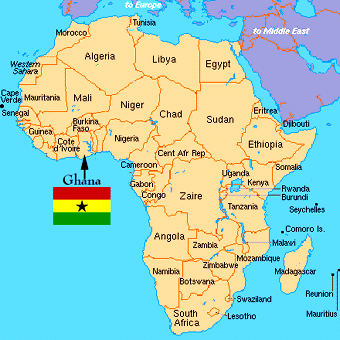| |
Ghana, the former “Gold Coast”, has enjoyed independence from the British since 1957. Its peaceful, hassle-free and low corrupt status has earned it the title Africa for Beginners. Not having “done” sub-Saharan Africa and always ready for a warm start to the new year, we thought: “That’ll do for Christmas!” The visa application was a lengthy process with letters of invitation, referees and yellow fever vaccines required. Our 11-year old yellow-fever vaccine was not accepted, even though it’s supposedly valid for life. Another jab was necessary. We suppose that this, coupled with malaria prophylaxis, would put a lot of prospective tourists off. British Airways brought us from Zurich to Accra without any hitches, and our luggage even managed to be on the same flight, despite a very tight transfer in Heathrow. Top marks go to BA for the delicious Christmas dinner served on board and for their bikes-for-free policy. |
| |
| With 400 passengers on our flight and another two European jumbos on the tarmac when we landed, we concluded that the secret was out! However, on closer inspection, as we queued at immigration, 95% were locals returning for the festive season. Donna, at La Paradise Inn, gave us a great welcome and we just loved her beer-bottle Christmas tree! | 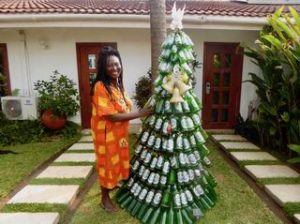
Donna at La Paradise Inn |
| |
| We stayed in Accra, the capital, long enough to acclimatise to the 33°C, taste a couple of local dishes and expose ourselves to the mayhem of Pleasure Beach. |
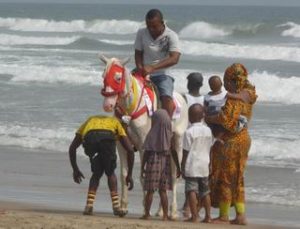
Horseriding on Pleasure Beach | Having secured a front-row table with shade, we let the world entertain us. Vendors sold everything from newly-born pups to paintings, jewellery and furniture, with horse rides and acrobatic performances to top the bill. Darina relaxed with a post-lunch shea butter foot massage, while Kurt had about 30 persistent offers to support local artists on the off chance it might enhance their possibilities of making it in Europe. |
| | |
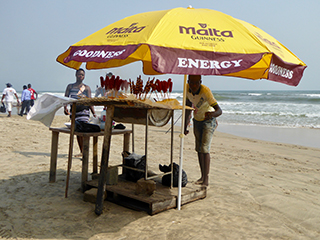 | 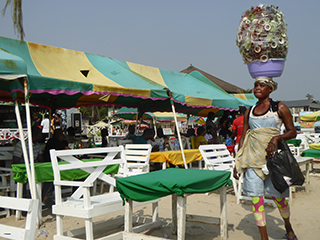 |
| Pleasure Beach, Accra |
| | |
| After 52,000km on Darina’s old reliable, it was time to send her 12-year old blue wonder into a well-earned retirement. This trip was the test ride for her new green Tout-Terrain Silkroad touring bike, and no better place to check if it was such a good idea to go without front suspension. | 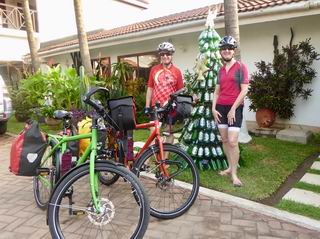
Bikes ready for off! |
| | |

Bike lane north of Accra | Leaving Accra on the northbound exit road, we were flabbergasted to encounter a designated bike lane. OK, at times we had to share it with market stalls, pedestrians and in contra taxis, but it was still a pleasant way to exit this city of 4 million. |
| | |
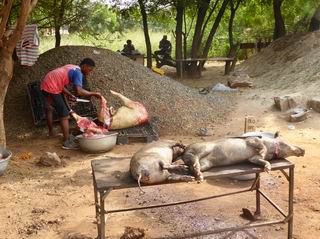
Roadside butcher | 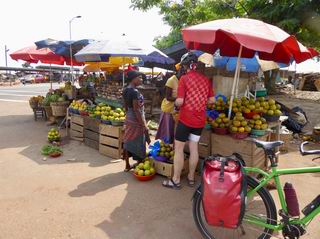
Roadside fruit stalls
|
| | |
| Our first stop was Aburi Gardens. Created by the British in 1890, they contain a fine international collection of trees and shrubs from around the British Empire, but it’s the extensive and numerous lawns that are used by school, family and church groups for bodily and spiritual fortification. | 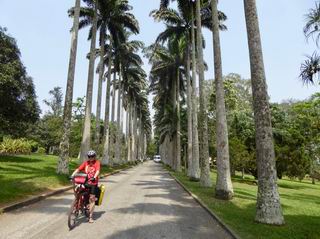
Aburi Gardens
|
| | |
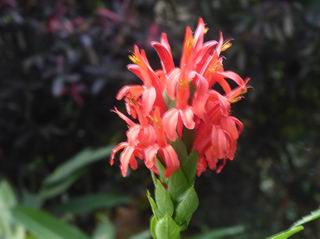 | 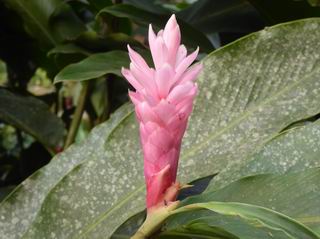 |
| Aburi gardens |
| | |
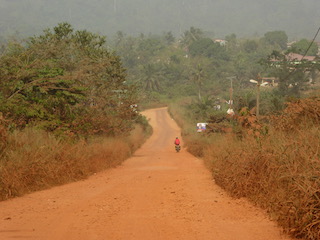
Hazy views in Dec & Jan | Following the ridge road north east, our views back to the coast and down to the valley were unfortunately non-existent. The Harmattan wind, blowing south from the Sahara at this time of year, casts a dusty hue making everything extremely hazy. On the up side, as temperatures soared to 37°C, it took the sting out of the sun, making it feel more like 27°C. |
|
| Reaching the Volta region, we were delighted to discover that the dotted line on our 2-year-old map was now an almost completely sealed road. Way to go, Ghana! But still wondered why this regional road was so busy, with the N2 parallel. The vegetation was lush and tropical with banana, mango and cocoa trees all sporting a dusting of the Sahara, and regular police checkpoints kept us entertained! | 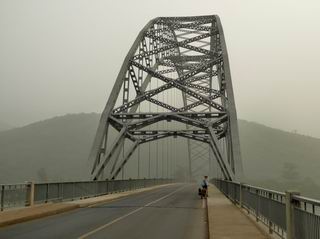
Bridge over the Volta River
|
| | |
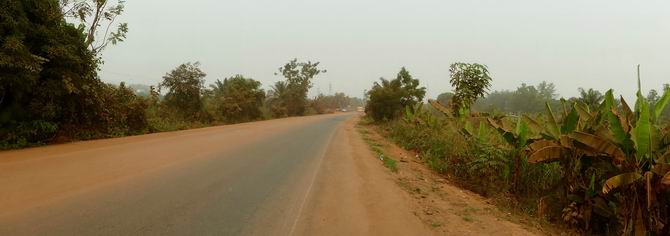
A coating of Sahara! |
| | |

Police checkpoint | 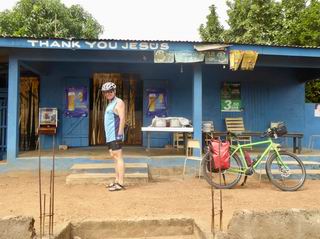
Chop bar morning break |
| | |
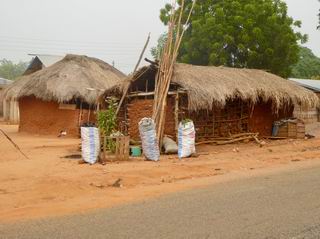
Typical village with mud huts | Following the Volta Reservoir north east, our hopes for some pleasant lake shore accommodation didn’t materialise. With a lot of enquiries after a long day on the bikes, we found a no-name guesthouse in a place called “Have”. The long search for food that evening led us to question the appropriacy of the town’s name! |
| | |
| The monkey sanctuary in Tafe Atone consists of 500 mona monkeys divided into 5 families. The community-based project supports local development including a library and an IT resource centre. |
| | |
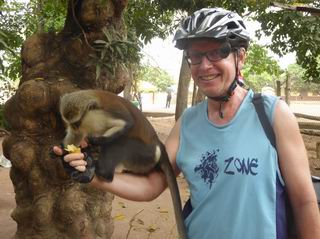 | 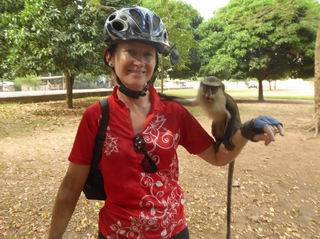 |
| | |
| Additional entertainment was to be had in a neighbouring village, as a few locals weaved for all they were worth on the roadside. The refreshing aspect of it all was that no one tried to sell us anything. Perhaps they could learn a few tricks from the lads on Pleasure Beach down in Accra! | 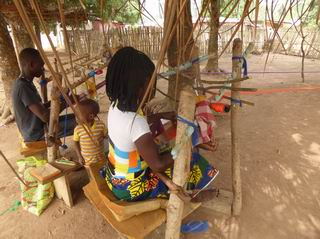
Roadside weaving |
| | |
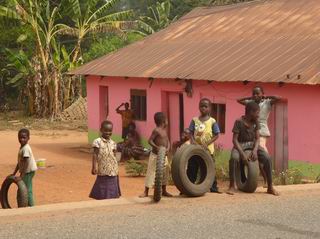
Friendly kids everywhere | Cycling along through quiet country roads, the distance between villages was minimal. As soon as we were spotted, a chorus of Obruniiiiiiii (white man) echoed from mud hut to mud hut, and bunches of children would appear to greet us. Their sincere smiles and enthusiastic waves were the most genuine welcome anyone could wish for! Akwaabaaaaaaaa! (Welcome!) |
| | |
| The mountain road back south direction Hoe was well-built and complete with warning signs about the dangerous zone we were entering. A number of overturned and burnt out lorries and cars dramatized the sign sufficiently. We got the message, but were pretty much the only vehicles on the road! | 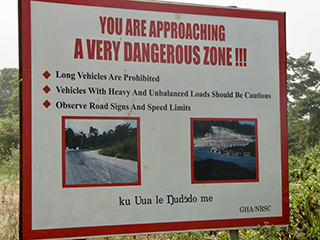
Balance your luggage now!
|
| | |
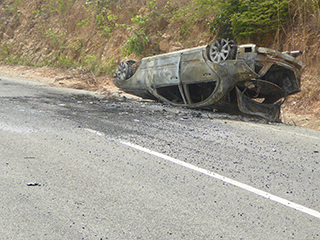 | 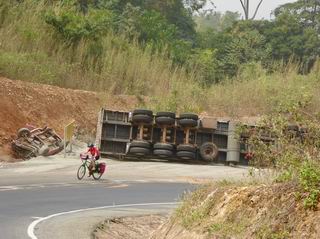 |
| We are warning you! |
| | |
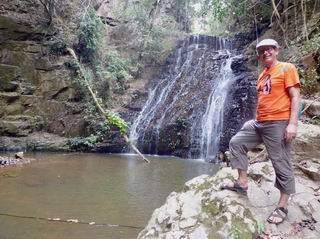
Kulugu river waterfall | A short hike to the Kulugu river waterfall had us dripping as much as the waterfall itself could muster. The abseiling to the pool would be a proper adventure in the rainy season, and not something for flip flops or dangling cameras. We opted against the pool experience knowing there was a village directly above! |
| | |
| From Hoe back to Senchi, we decided to take the N2 and were delighted with the traffic-free experience. That was until we hit the dust and sand and washboard surface that deteriorated to a rough tractor path closer to Senchi. Now we understood, why the other road was so busy! The villages in this area were extremely poor, but the colourful local market day lifted our spirits no end. | 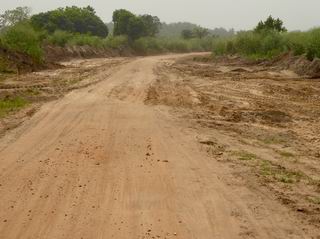
The N2
|
| | |
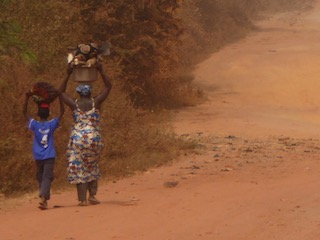
On the N2 | 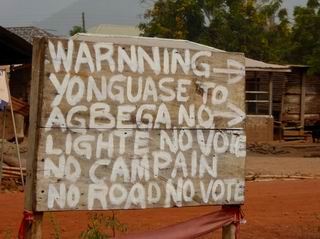
No road, no vote!
|
| |
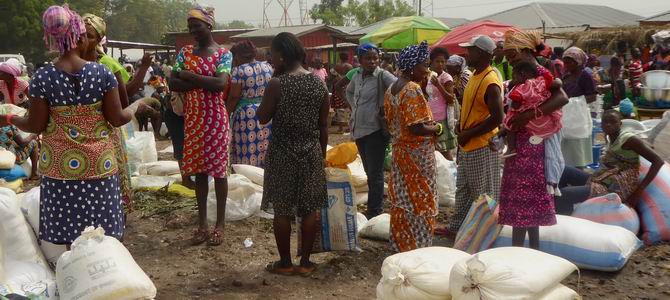
Colourful market on the N2
|
| |
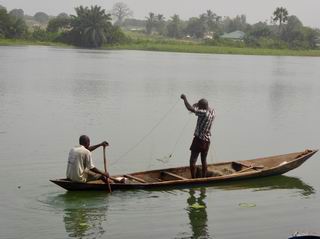
Fishing in the Volta River | We were rewarded with a low-key lakeside resort in Senchi at the end of a very strenuous day. |
|
| Construction of the Akosombo Dam was completed by an Italian company in 1965 to provide domestic hydroelectric power for Ghana, Togo and Benin. However, the initial plans including an aluminium smelter never materialised. The embankment dam of gravel and clay created the largest man-made lake in the world (over 8,000km2), soon to be surpassed by the Chinese. Lower levels of water in recent years means that during the dry season electricity has to be imported from the Ivory Coast. |
| |

Akosombo dam
|
| | |
The quiet country roads leading to Koforidua were a hive of activity with small-scale brick and shea butter* production, while cacao beans, chilli peppers and fish were drying on the roadside in the sun. * Shea butter is used in cosmetic products such as soap, moisturizer and hair conditioner. | 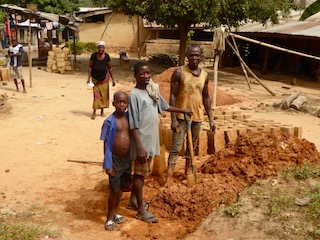
Brick production |
| | |
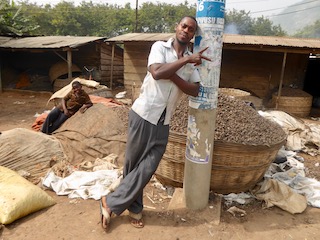
Shea oil production | 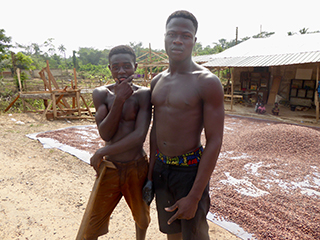
Drying cocoa beans |
| |
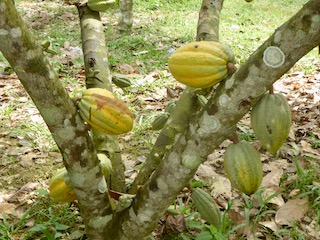
Cocoa | At the Cocoa Research Institute, we learned all there is to know about planting, harvesting and producing cocoa. Ghana is the 2nd biggest exporter worldwide of cocoa (700,000 tonnes/year), all from small scale farms. A huge emphasis is placed on quality, as well as pest control, and farmers are even supplied with free cocoa seeds. Our guide Susi, harvested some for us so that we could chew on the pulp, while visiting the various research stations. |
| | |
| The aluminium smelter that never happened left bauxite for millennia that the locals started turning into beads, with the support of a 2-year Peace Corp project. Asanti demonstrated the process, but now that the American volunteers have returned home, it seems that the production of beads has ceased and only a few straggler pieces of jewellery were left for sale. | 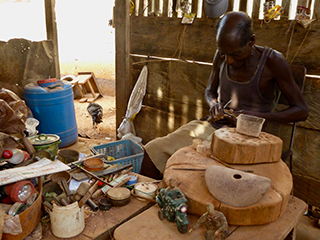
Asanti
|
| | |
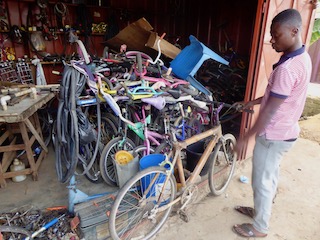
Felix with his bamboo bike | Another project availing of local resources is Bamboosero, making bicycle frames out of bamboo. Felix, one of the three company members, gave us an overview of the treatment and construction of the various frame options. If you’re interested, a frame costs 470 USD and is made to measure on demand. |
| | |
| To save a couple of days on the busy main road into Kumasi, we took a tro tro (shared mini bus). The back seat was screwed out in no time to make place for our bicycles and we did the 160km in 3 hours! | 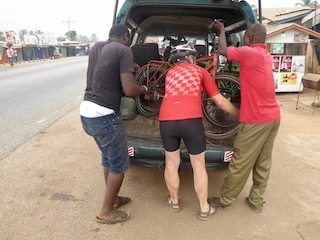
Tro tro ride
|
| | |

Colourful kente fabric | Kumasi, Ghana’s second biggest city of 2 million is one huge bustling, aggressive and happening market place. Certainly, not for the faint of heart or anyone with claustrophobic tendencies. It wasn’t our favourite! |
| | |
The city is home to the Ashanti tribe, that ruled a big kingdom throughout the early colonial days, The tribe’s king’s palace, a building bought from the British in 1925, contains all sorts of paraphernalia related to local customs and state visits. The king lives next door and is still a referred member of local society. What made Kumasi worthwhile for us was Vic Bamboo’s Café, where we indulged in authentic south Indian dishes, thanks to the local Indian/Ghanian owner. |
| | |
On the subject of food, Ghana has a number of local dishes that we really enjoyed. Red red is a delicious spicy bean casserole served with sweet fried plantains. The staple tends to be a pounded cassava/maize dough, known as banku/fufu, served in a ground nut soup with chicken/fish, eaten with the (right) hand. This did tend to become monotonous after a while! | 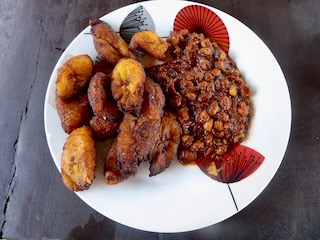
Red red bean casserole |
| | |

Pounding banku | 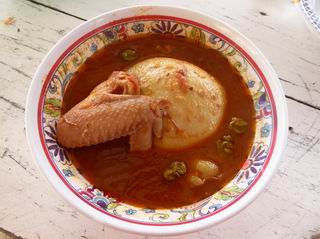
Banku & chicken |
| | |
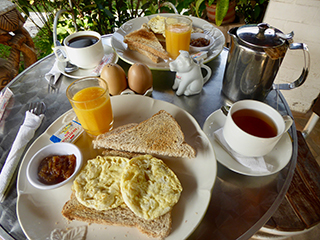
European breakfast | Breakfast could be a European omelette, toast and tea/coffee in a hotel, or waakye (rice and beans served with noodles and shito, a spicy chilli sauce). Alternatively, we had red-red or cose bean/flour fritters. On a food stall, 1-2 cedis (0.25-0.50€) saw us through, whereas in a restaurant, a European breakfast cost up to 16 cedis (4€)/person. We were happy with whatever was available! |
| | |
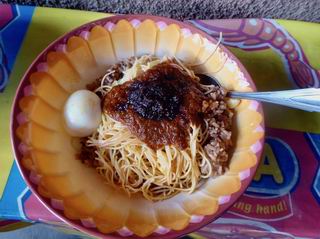
Waakye for breakfast | 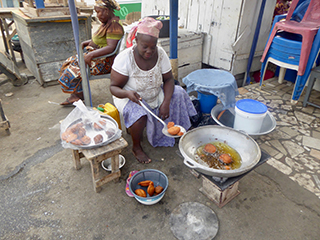
Cose fritter food stall |
| | |
| Fast food on the street depended on how much fish/meat was included. Jollof rice (fried rice) was about 2 cedis (0.50€). Add chicken and you’re up to a euro. In a hotel restaurant, the same could come to 20 cedis (5€), with one-hour preparation time. | 
Jollof rice and fried tilapia fish |
| | |
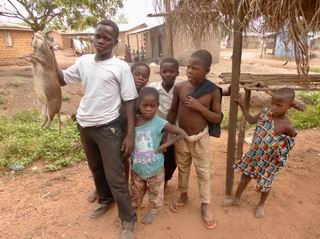
Fancy a grasscutter? | On day 2, Darina stopped to see what a bunch of boys were selling. Much to her dismay, they proudly presented her with a big rat lookalike, called grasscutter. They had caught it in the bush and were selling it for an enormous price. Without hesitation, Darina decided to turn vegetarian for the remainder of her stay. Easier said than done, she passified herself at food stalls with the theory that a dish costing just 1€ could hardly contain this expensive delicacy! |
| | |
| Our evening meal was often at a food stall. We examined the various pots and made our choices before sitting down in the dark, on the side of a busy street/road, with numerous boom boxes blaring music ranging from reggae to Christian songs to local disco/rap. We could neither see what we were eating, nor hear what the other one was saying! And because we’d washed our hands with the washing up liquid provided, everything tasted a tad soapy! | 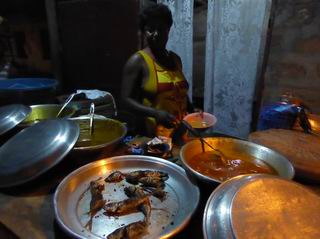
Evening food stall |
| |
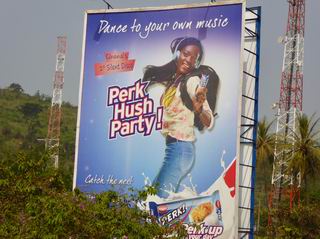
Ghana’s 1st silent disco! | Yes, the Ghanaians love their music and the louder, the better. At the drop of a hat they start grooving to whatever beat is going down. We couldn’t help but notice huge billboards advertising hush parties, where you turn up with your mobile phone and headphones to dance to your own music. What was referred to as Ghana’s 1st silent disco seemed novel, but none of the locals could see the attraction! |
| | |
| Uncle Arthur has a brewery in Kumasi, and every village boasts at least one chop bar adorned with Guinness slogans. A chop bar is basically a joint that sells drinks, mostly alcohol, and if you’re lucky might also have some banku at lunchtime. Kurt preferred the local Club lager, while Darina got to test all sorts of non-alcoholic malt and energy drinks, as well as fresh fruit juices. | 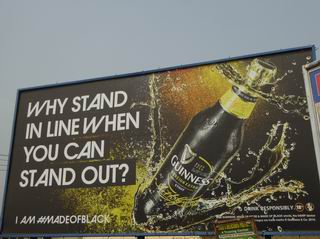
Guinness is a big seller in Ghana |
| |
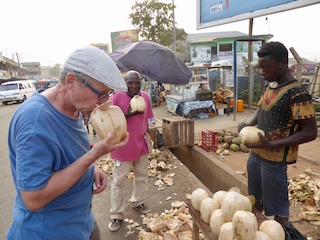
Fresh coconut water | 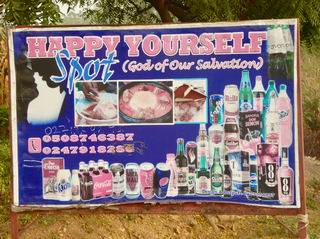
This would be a chop bar sign!
|
| | |
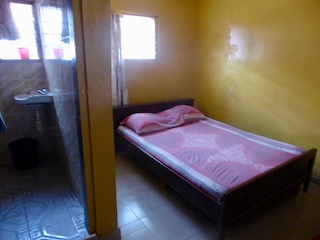
10€ double en suite | On the accommodation front, we always managed to find a guesthouse or hotel, with or without running water, but with a private bathroom. Prices varied from 10€ – 80€+/night depending on its proximity to Accra, a seriously overpriced city. |
| | |
| Our best 60km of road was the N8, a beautiful runway with a hard shoulder, built by the Japanese. Arigato gozaimashita! It sadly came to an end at the state border of the Central Region. | 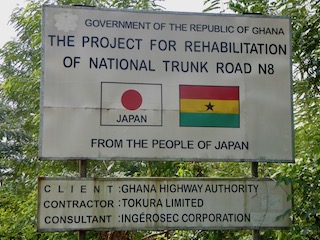
Best road in Ghana! |
| |
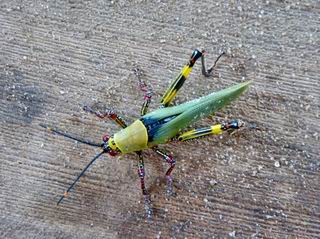
Before | 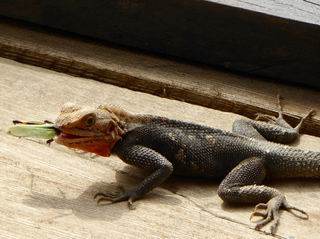
… and after! |
| |
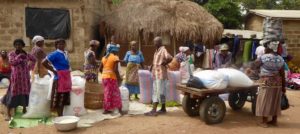 Market day Market day |
| |
| Ghana’s colonial past is not the most uplifting. The Portuguese were the first to discover trade possibilities, exchanging guns and gunpowder for gold and later, slaves. The Dutch, Swedish, Danish and British followed suit and the numerous forts on the coast have a harrowing story to tell. |
| | |
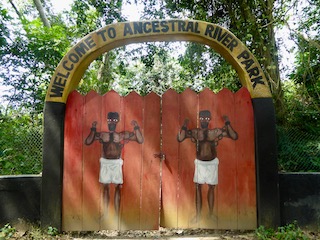
Slaves’ last bathing place | The first site of historical importance was the last bathing place at Assin Manso, where shackled slaves were fed and allowed to bathe to look their best for the slave auction, where the colonial agents would make their choices, before marching them south to their respective forts to wait for the next shipment abroad. |
| | |
| Two of the more famous forts are in Cape Coast and Elmina. During our tours, we learned of the horrendous inhumane conditions men, women and children were exposed for months on end. Packed like sardines and lying sometimes 3 deep in the dungeons without any sanitary conditions, fresh air or daylight, they were led through the door of no return to further endure a ghastly Atlantic crossing to North and South America, as well as the Caribbean. | 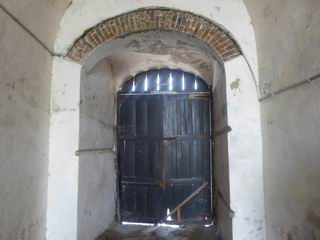
The door of no return
|
| | |

Cape Coast castle
|
| | |
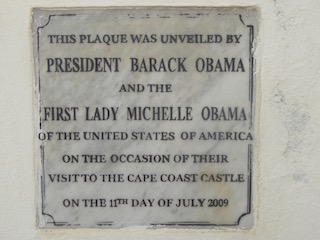
Plaque in Cape Coast castle | It was certainly an emotional moment for Ghana and for Michelle Obama, a slave descendent, when she visited in 2009. To celebrate the return of slave descendants, the infamous door has been renamed the door of return and Ghanaians are determined not to point the finger for this dark chapter of their history, but invite us all to learn from it. |
| | |
IN EVERLASTING MEMORY of the anguish of our ancestors. May those who died, rest in peace. May those who return, find their roots. May humanity never again perpetrate such injustice against humanity. We, the living vow to uphold this. Plaque in Cape Coast castle |
| | |
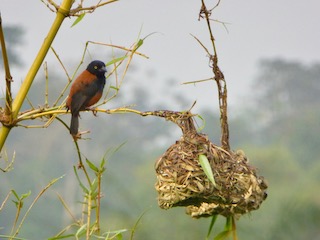
Bird watching | 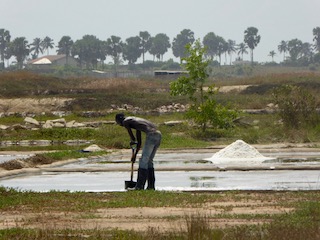
Saltponds |
| | |
| From here, we made a few stops along the coast en route back to Accra. The beaches had varying states of cleanliness, but we can highly recommend these three guesthouses for their friendliness, customer service and attention to detail. | 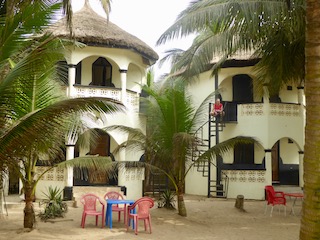
Mapopo Beach Guesthouse,
Saltpond
|
| | |
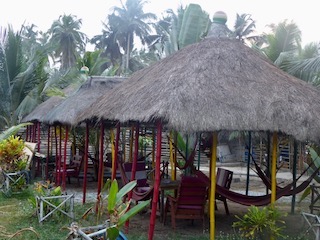
Jah Mighty Love Land, Winneba | 
Leela & Rik, Sleeping Hyppo, Accra |
| | |
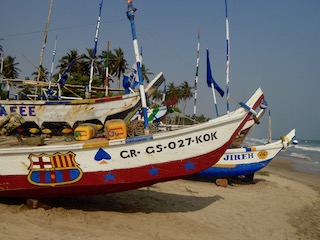 | 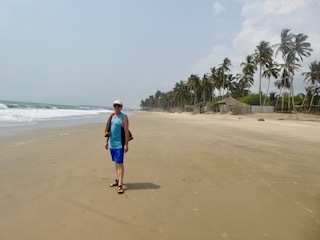 |
| Kokrobite strand |
| |
| What entertained us no end along the coast was the local fishing process. Nets are cast each morning and left for about 3 hours to fill, before the whole village lends a hand to pull in the catch. Once the fish is beached, it is sorted according to size for local consumption, drying and the market. |
| | |
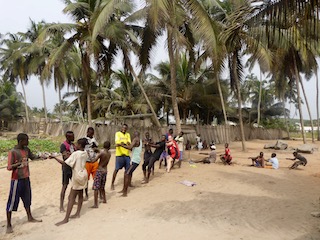
Pulling in the fishing nets | 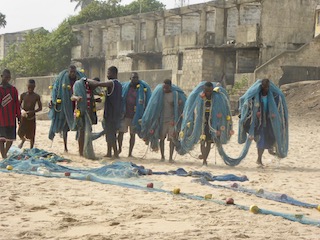
Gathering up the nets
|
| |
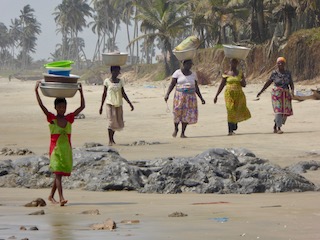
Arriving for the catch | 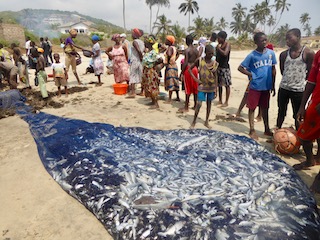
Catch for the whole village
|
| | |
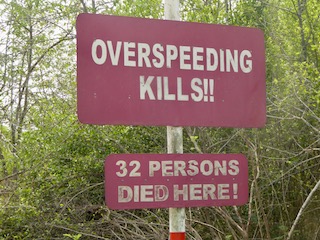
Constant reminders | The only drawback with this coastal area, is the national route number 1 that links all the west African countries. We were reminded every 5km of the death toll on this stretch, where “overspeeding kills”. We did our best to avoid it with back roads and sand tracks, thanks to Google Maps, which even led us past salt pans and happening markets. |
| | |
There was no way of avoiding the last stretch of the N1 back into Accra. It was hairy in places, but at least it was city traffic, that slowed things down somewhat. The constant jostle for space between tro tro mini buses, coaches, share taxis, 4x4s and ordinary traffic was hectic to say the least. With no less that 100m to go before turning off this notorious road, Darina was knocked down by a taxi driver, rushing to Friday prayers. The helmet smashed on impact, Darina ended up with a bump on her head and a few cuts and bruises, while her new green baby didn’t get a much as a scratch! | 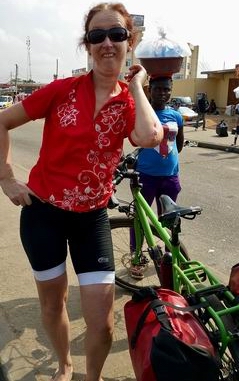
A close shave!
|
| | |
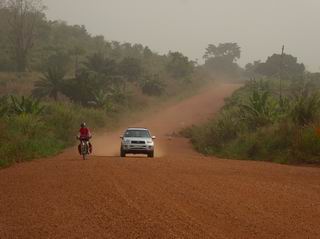
Considerate drivers | On that note, we would like to point out that, with the exception of the N1 and the first 30km southbound from Kumasi, we felt very safe cycling in Ghana and found the drivers to be very respectful and patient. |
| | |
| To celebrate Darina’s survival, we spent the afternoon with Mr Eric, the coffin maker. His eccentric caskets reflect the profession, hobby, vice or dream of the deceased, and can even be delivered overseas! Here you see him with coffins in the form of a mobile phone, star beer bottle and sack of rice. Of course, a Guinness casket could have other uses like a novel drinks cabinet in the corner of your living room! | 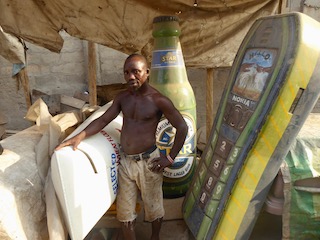
Mr Eric, the coffin maker
|
| | |
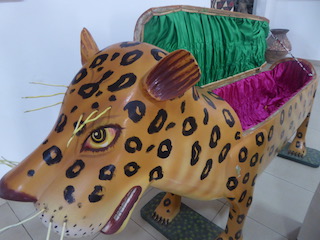
A jaguar coffin | 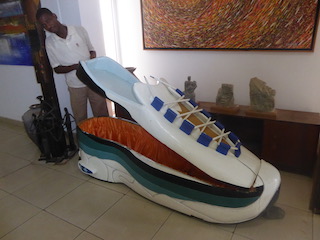
A sneaker coffin
|
| | |

Posters announcing the funeral | You’re probably wondering how Mr Eric manages to finish such creations in time for the funeral. Well, it’s not unusual for the body to lie in the morgue for up to a year, so that all the family members can return from abroad for the 3-day event. Mourners dress in black and red and after initial formalities, the drumming and dancing take over and it turns into a mega party. An Irish wake wouldn’t get a look in! |
| | |
| Ghanaians are a very peaceful bunch with multi-denominations living side by side without friction. 74% are Christian, while 18% are Muslim. Any one village could have 4-12 different congregations, with bishops, preachers, prophets and healers promising everything from spiritual healing and hope, to job promotion and US visas! Kurt reckons the best selling book this Christmas was A 1000 churches to join before you die ! | 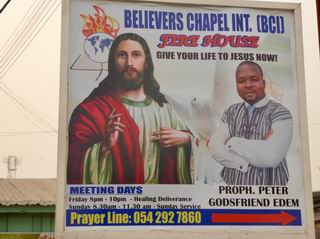
Believers’ Chapel International |
| | |
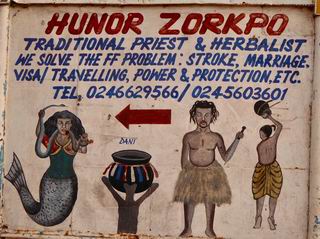
Traditional priest & herbalist | 
Herbal centre
|
| | |
| Shop names often implore God’s help for success. Examples include “God can’t fail beauty parlour”, “Try Jesus Pastries”, “The Finger of God maternity clinic” or “The Blood of Jesus barber”. There was no convincing Kurt that he needed a shave that day! | 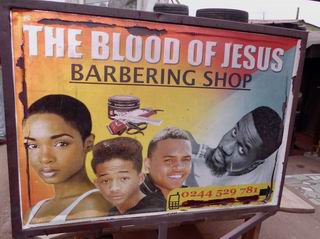
Up for a shave?
|
| | |
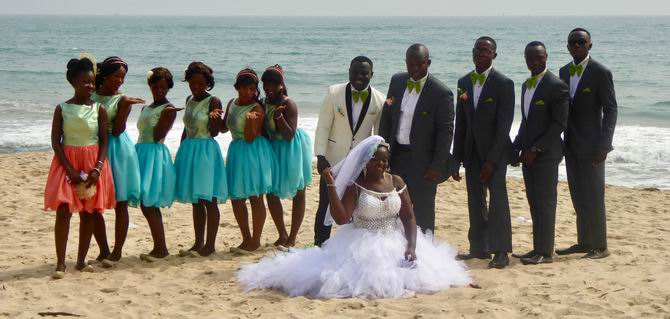
Ghanaian wedding party |
| | |

N17 inspiration? | With the concentration of saw doctors in Ghana, we can only assume that our wonderful Galway musicians were somehow inspired on these shores! Actually, if they cycled some of the roads we encountered, there’s a fair chance The N17 was even written in Ghana! I wish I was on the N17 Stone walls and the grass is green Travelling with just my thoughts & dreams
|
| | |
| With average temperatures of 36/37°C on a daily basis, these lads drying cocoa beans on the side of the road donning woolie caps were a bit of a puzzle. Darina just had to stop and investigate! As it happens, they are hoping to go to work in Canada and were just getting into the spirit of things and training for their dream life ahead! | 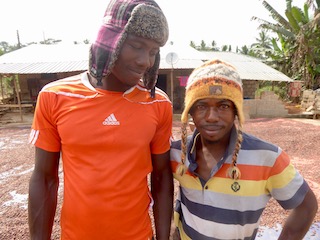
Training for Canada! |
| | |

The new president | We were in Ghana for the peaceful inauguration of the new president, Nana Akufo Addo. This was his third time running for the post, and it was his promise to bring a factory to each district that clinched the deal in this campaign. The Irish would be interested to read that he has also promised to reduce water charges! |
| | |
| His takover was a mega street celebration with dancing and drumming into the early hours. The blue, white and red of the New Patriotic Party was sported by all and sundry, even down to presidential flip-flops! | 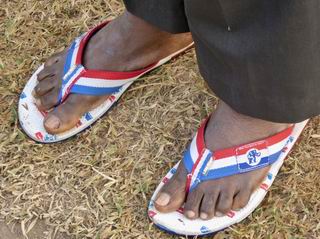
Presidential flip-flops!
|
| |
| Kofi Annan, the former UN Secretary General and Nobel Peace Prize recipient, is probably Ghana’s most famous citizen. While in the UN, Annan outlined his vision to reduce poverty and hunger, which materialised into the Milennium Development Goals in the year 2000. The 15-year project had major success in Annan’s home country, halving extreme poverty and halving the number of people without access to safe drinking water. |
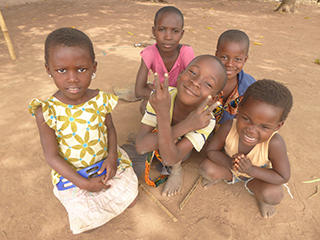
The future of Ghana | The southern area that we cycled through would reflect this achievement, while in the northern regions, it is estimated that 45% of the population is still below the extreme poverty line. Let’s hope Nana Akufo Addo will be able to fulfill his presidential promises and that the whole of Ghana will continue on the road to success. |
| | |
| Ghana was certainly a gentle entry to the African culture and continent. People could not have been friendlier and we felt completely safe at all times. It did take us a while to figure out the food stalls etc, and despite a few monotonous banku/fufu meals, we ate quite well. From a cyclists’ point of view, road quality varies enormously, and based on the off-road experience, Darina has since opted for a front-suspension fork! | 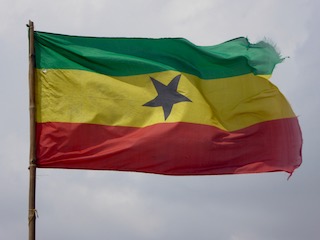
The Ghanaian flag |
| |

